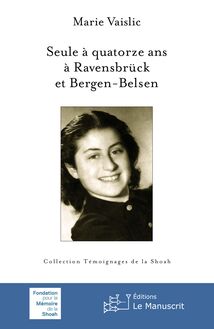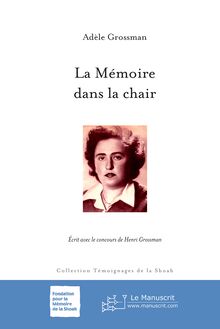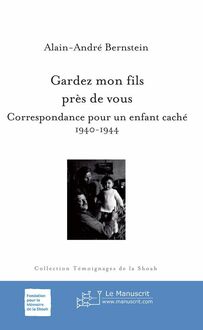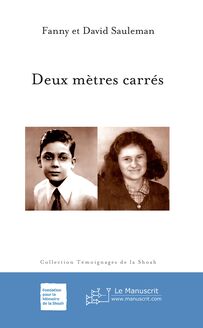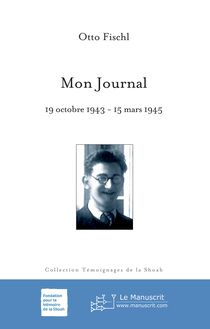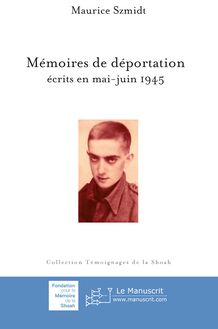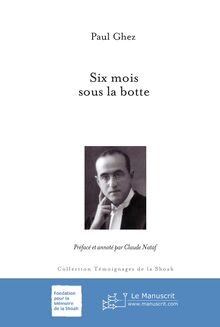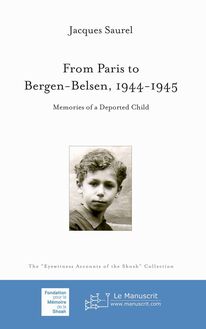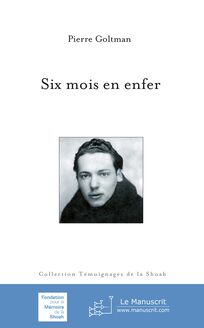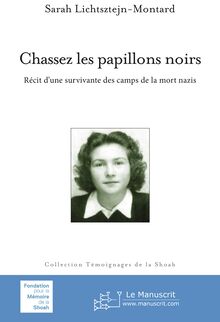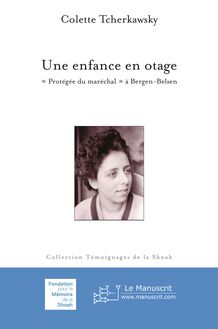-
 Univers
Univers
-
 Ebooks
Ebooks
-
 Livres audio
Livres audio
-
 Presse
Presse
-
 Podcasts
Podcasts
-
 BD
BD
-
 Documents
Documents
-
- Cours
- Révisions
- Ressources pédagogiques
- Sciences de l’éducation
- Manuels scolaires
- Langues
- Travaux de classe
- Annales de BEP
- Etudes supérieures
- Maternelle et primaire
- Fiches de lecture
- Orientation scolaire
- Méthodologie
- Corrigés de devoir
- Annales d’examens et concours
- Annales du bac
- Annales du brevet
- Rapports de stage
La lecture à portée de main
Vous pourrez modifier la taille du texte de cet ouvrage
Découvre YouScribe en t'inscrivant gratuitement
Je m'inscrisDécouvre YouScribe en t'inscrivant gratuitement
Je m'inscrisEn savoir plus
Vous pourrez modifier la taille du texte de cet ouvrage
En savoir plus

Description
Sujets
Informations
| Publié par | Éditions Le Manuscrit |
| Date de parution | 01 janvier 2020 |
| Nombre de lectures | 0 |
| EAN13 | 9782304034431 |
| Langue | English |
Informations légales : prix de location à la page 0,0250€. Cette information est donnée uniquement à titre indicatif conformément à la législation en vigueur.
Extrait
Jacques Saurel
From Paris to Bergen-Belsen 1944-1945 Memories of a Deported Child
Preface by Raymond Riquier Translation from the French: Jack Altman
the “eyewitness accounts of the shoah” collection
Le Manuscrit
© Éditions Le Manuscrit, 2019
ISBN : 9782304034431
Jacques Saurel
“Eyewitness Accounts of the Shoah” a series published for the Fondation pour la Mémoire de la Shoah (Foundation for the Memory of the Shoah)
With its “Eyewitness Accounts of the Shoah” published in association Foundation seeks to preserve for a wide readership the memory of victims and witnesses of the dark years of anti-Semitic persecution from 1933 to 1945.
In addition to the many works already published else-where, the Foundation hopes in this way to present the stories of those men and women whose voices have remained unheard until now: reminiscences often buried deep inside individual or family memories, stories sometimes written down but never published, accounts that were published at the time of leaving the hell of the camps, only to remain for too long hidden away on library shelves.
If one person alone cannot describe the unspeakable, this multiplicity of accounts may at least get close.
At any rate, that is the aim this collection has set itself with the moral and historical support of the Foundation, thanks to its editorial board of scholars and eyewitnesses.
Confronted with the manner in which present-day conflicts may be exploited to obscure, distort and trivialize the reality of the Shoah, this collection will enable readers, researchers and students to gauge the specific nature of persecution in its most extreme form - a persecution in which some were actors, others accomplices, and to which some people remained indifferent while others were truly heroic.
It is our wish that these works may encourage a spirit of fraternity in moving readers to counter anti-Semitism and all other forms of exclusion.
Visit the Internet site of the Foundation of the Memory of the Shoah: www.fondationshoah.org
Editorial Board for the Collection
Serge Klarsfeld, president
Henri Borlant, deportation survivor
Isabelle Choko, deportation survivor
Olivier Coquard, historian
Katy Hazan (OSE), historian
Dominique Missika, historian
Denis Peschanski, historian
Paul Schaffer, deportation survivor
Annette Zaidman, hidden child
Philippe Weyl, head of the collection
For other titles in the collection, go the the end of the book.
Biography of Jacques Saurel, born Szwarcenberg
1933 February 19: Jacques Szwarcenberg born in Paris. His elder sister Irène was nearly 2. His Polish-Jewish parents were married January 21, 1930. His mother Berthe, née Bentkowski, born 1912 in Warsaw, emigrated to France with her parents, brother and sister in 1923. His father Henri, born in Piascezno in 1909, arrived in Paris in 1924 with his parents and four brothers.
Jacques’ parents worked in a leather workshop in Paris.
1934 December: birth of his brother Roger.
1936 January: birth of his sister Alice.
1939 The Szwarcenbergs lived 28 Avenue du Belvédère in the northern suburb of Pré-Saint-Gervais (today Seine-Saint-Denis). His paternal grandparents lived a few doors away. The grandfather ran a cobbler’s shop.
September 3: France and Britain declared war on Germany two days after its invasion of Poland. Outbreak of World War II.
Jacques’ father Henri enlisted as a volunteer in the French Foreign Legion. His brother-in-law Maurice did likewise and was posted to a regiment in Algeria. Following the Allied landings of November 1942, he joined the British Army and served in London.
October, the municipality of Pré-Saint-Gervais arranged for the evacuation of Jacques, his brothers, sisters and mother to Trizay-Coutretôt, a village 150 km south-west of Paris.
Christmas, Jacques’ father spent the holidays with his family.
1940 January 24: Jacques’ father entered the armed forces, joining the 21st Infantry Regiment for foreign volunteers, March 3.
May 10: beginning of the German military offensive.
June 22: Franco-German armistice signed at Rethondes in the Forest of Compiègne north of Paris. Two-thirds of France occupied by the Germans.
June 26: Jacques’ father captured in the village of Allain, south-west of Nancy, on a reconnaissance mission. He was interned in a prison-of-war camp at Hombourg-Haut, a subsidiary of the Stalag XII F at nearby Forbach (annexed by the Germans, now once again part of French Lorraine).
July: the family returned to Pré-Saint-Gervais.
October: Jacques and his brothers and sisters went back to school.
The family were subjected to new laws discriminating against the Jews and experienced financial difficulties.
1942 Spring: Jacques’ paternal uncle Joseph was arrested with his wife and two children. He was deported from the camp at Pithiviers to Auschwitz by Convoy N°4 (June 25). His family also disappeared but the circum-stances remaine unknown.
Jacques’ paternal uncle Robert was arrested during a police-check at the Château-de-Vincennes bus station. He disappeared without trace.
Aunt Céline, his mother’s sister, was arrested by police at her home, interned in the camp at Drancy, then deported by Convoy N°11 (July 27) to Auschwitz, where she took her own life.
Boubelé, Jacques’ maternal grandmother, was left alone and came to live with the family in Pré-Saint-Gervais.
June 7: wearing of the yellow star became obligatory for Jews over 6 in the Occupied Zone.
July 16: Dora and Mosek, the paternal grandparents and their youngest son Salomon, were taken in the police-raid known as the “rafle du Vél’ d’Hiv’” - the round-up of Jews in Paris’s Winter Velodrome (bicycle arena). Salomon was deported from the camp at Drancy by Convoy N°25 (August 28) to Auschwitz, where his parents had arrived from Beaune-la-Rolande by Convoy N°15 (August 5). They never returned.
A cousin of Jacques’ mother, his wife and two small children, also became victims of the Shoah.
October: his little sister Alice was evacuated to a farm in the Loire region of the Sarthe, south-west of Paris.
1943 July: his brother Roger was placed with another family in the Sarthe.
The family imagined it was safe from the police round-ups thanks to the father’s status as prisoner of war.
1944 January: Roger returned to the family home because of the pending birth of a child in the house where he was billeted in the Sarthe.
February 3 and 4: just after midnight Jacques, Roger, Irène and their mother were arrested at their home by the French police (Boubelé was not on the list). From the police-station, they were transferred to the camp at Drancy.
May 3: Jacques and his family were transport-ed by bus to the Gare de l’Est railway station, from which they were deported in a regular passenger-train, as a family of a prisoner-of-war protected by the Geneva Convention. This convoy numbered 74 people.
May 5: they arrived in Hanover from which they were transported by road to the Bergen-Belsen Camp. They were interned in the part known as the “Star Camp” grouping Jews who would be held hostage as bargain-ing counters. There were 258 deportees from France: 177 wives of prisoners (41 of them mothers) and 77 children (15 of these without their mother).
June 6: D-Day landing of the Allies in Normandy.
Autumn: at Bergen-Belsen, many prisoners from the other Nazi camps were brought in to provide forced labour for the German armaments industry. Living conditions grew worse, but the mothers, also subjected to forced labour, managed to keep their children alive.
Year’s end: France was liberated. Grandmother Boubelé brought Alice back from the Sarthe to Pré-Saint-Gervais.
December: Bergen-Belsen saw the influx of thousands of prisoners deported from Nazi camps in the east ahead of the Soviet forces’ advance. In the course of the winter, Bergen-Belsen was transformed by the SS into a death camp.
1945 April 9: Jacques, Roger, Irène and Berthe were transported out of Bergen-Belsen by what became known as a Ghost Train. About 2,000 Jews from the Star Camp embarked on this journey.
April 15: British troops liberated the Bergen-Belsen Camp. They found 60,000 prisoners, plus 13,000 dead lying around on the ground.
April 23: the Germans abandoned the Ghost Train near the south Brandenburg village of Tröbitz. Jacques contracted typhus - as did his sister Irène. The territory was liberated by Russian Cossacks and the village placed under quarantine.
May 8: end of World War II in Europe.
June: Jacques, Irène, Roger and their mother were brought back to Paris. They travelled by lorry via Leipzig to Strasbourg, then by train to Paris.
June 23: they arrived at the Hotel Lutetia repatriation centre where they were reunited with the father, back in France since March 29.
Jacques’ paternal uncle Léon, spent the war in a psychiatric hospital in Ville-Evrard outside Paris. Nobody survived among the family left in Poland.
Summer: Jacques and his sisters recovered in the Vendée countryside, their brother Roger in a sanatorium at Villard-de-Lands in the Alps and their parents in a rest home on the French Riviera.
1946 Jacques came first in an exam to enter a secondary School in Paris’s 19 th arrondissement.
1947 To help his parents support the family, he had to go to work in the garment business.
1953-1955 Jac
-
 Univers
Univers
-
 Ebooks
Ebooks
-
 Livres audio
Livres audio
-
 Presse
Presse
-
 Podcasts
Podcasts
-
 BD
BD
-
 Documents
Documents
-
Jeunesse
-
Littérature
-
Ressources professionnelles
-
Santé et bien-être
-
Savoirs
-
Education
-
Loisirs et hobbies
-
Art, musique et cinéma
-
Actualité et débat de société
-
Jeunesse
-
Littérature
-
Ressources professionnelles
-
Santé et bien-être
-
Savoirs
-
Education
-
Loisirs et hobbies
-
Art, musique et cinéma
-
Actualité et débat de société
-
Actualités
-
Lifestyle
-
Presse jeunesse
-
Presse professionnelle
-
Pratique
-
Presse sportive
-
Presse internationale
-
Culture & Médias
-
Action et Aventures
-
Science-fiction et Fantasy
-
Société
-
Jeunesse
-
Littérature
-
Ressources professionnelles
-
Santé et bien-être
-
Savoirs
-
Education
-
Loisirs et hobbies
-
Art, musique et cinéma
-
Actualité et débat de société
- Cours
- Révisions
- Ressources pédagogiques
- Sciences de l’éducation
- Manuels scolaires
- Langues
- Travaux de classe
- Annales de BEP
- Etudes supérieures
- Maternelle et primaire
- Fiches de lecture
- Orientation scolaire
- Méthodologie
- Corrigés de devoir
- Annales d’examens et concours
- Annales du bac
- Annales du brevet
- Rapports de stage
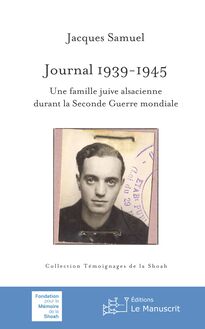
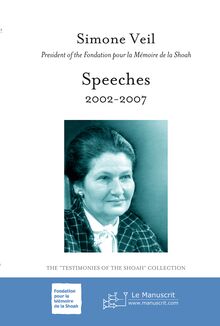
![[En]quête de famille](https://img.uscri.be/pth/2d18ccf0814431f0b2cebbf9d26faf0e9ab5ea36)
